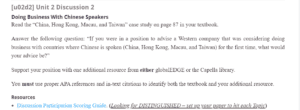Doing Business with Chinese Speakers
Internationally doing business means dealing with the significant cultural differences that differentiate states. Language and cultural barriers are the main challenges influencing business prospects in the globalized market. Chinese-speaking countries such as Taiwan, China, Macau, and Hong Kong have significant language and cultural differences compared to the Western world. Therefore, a business that wants to transact with other businesses in such territories may need to take the following actions.
Are you interested in obtaining a unique copy of “Doing Business with Chinese Speakers”? Get in touch with us.
First, western businesses need to study the cultures of each of the countries individually. The similarity in these cultures does not imply that they are identical. Every culture is unique, affecting their business behaviors and practices. Take, for example, the case of Hong Kong and mainland China. While these are the same country, they are significantly different in terms of culture (Hill & Hult, 2019). Therefore, a Western business person must understand them individually to communicate and do business with people from the two regions.
Another thing that Western businesses can do is keep an open mind regarding learning. Theoretical learning of Asian cultures will not prepare them enough for one-on-one business with Chinese speakers. During actual business transactions, it is essential to be open to learning. When mistakes are made, they must try to learn from them for better business interaction with multicultural business associates (Schweitzer, 2015). Translators can be essential for creating a link between English and Chinese speakers. This will help to maintain some form of communication and enable business success in the international market.
Similar Post: Interpersonal Reflection
References
Hill, C., & Hult, T., (2019). Global Business Today Asia-Pacific Perspective. McGraw-Hill Education.
Schweitzer, S. (2015). Access To Asia: Your Multicultural Guide To Building Trust, Inspiring Respect, And Creating Long-Lasting Business Relationships. John Wiley & Sons.
ORDER A PLAGIARISM-FREE PAPER HERE
We’ll write everything from scratch
Question
[u02d2] Unit 2 Discussion 2
Doing Business With Chinese Speakers
Read the “China, Hong Kong, Macau, and Taiwan” case study on page 87 in your textbook.

Doing Business with Chinese Speakers
Answer the following question: “If you were in a position to advise a Western company that was considering doing business with countries where Chinese is spoken (China, Hong Kong, Macau, and Taiwan) for the first time, what would your advice be?”
Support your position with one additional resource from either globalEDGE or the Capella library.
You must use proper APA references and in-text citations to identify both the textbook and your additional resource.
Resources
- Discussion Participation Scoring Guide. (Looking for DISTINGUISHED – set up your paper to hit each Topic)
UNDERGRADUATE DISCUSSION PARTICIPATION SCORING GUIDE
Due Date: End of weekly
Percentage of Course Grade: 30%.
| UNDERGRADUATE DISCUSSION PARTICIPATION GRADING RUBRIC | ||||
| Criteria | Non-performance | Basic | Proficient | Distinguished |
| Apply relevant course concepts, theories, or materials correctly. 33% |
Does not explain relevant course concepts, theories, or materials. | Explains relevant course concepts, theories, or materials. | Applies relevant course concepts, theories, or materials correctly. | Analyzes course concepts, theories, or materials correctly, using examples or supporting evidence. |
| Collaborate with fellow learners, relating the discussion to relevant course concepts. 33% |
Does not collaborate with fellow learners. | Collaborates with fellow learners without relating the discussion to the relevant course concepts. | Collaborates with fellow learners, relating the discussion to relevant course concepts. | Collaborates with fellow learners, relating the discussion to relevant course concepts and extending the dialogue. |
| Apply relevant professional, personal, or other real-world experiences. 34% |
Does not contribute professional, personal, or other real-world experiences. | Contributes professional, personal, or other real-world experiences, but contributions lack relevance. | Applies relevant professional, personal, or other real-world experiences. | Applies relevant professional, personal, or other real-world experiences to extend the dialogue. |
Participation Guidelines
Actively participate in discussions. To do this you should create a substantive post for each of the discussion topics. Each post should demonstrate your achievement of the participation criteria. In addition, you should respond to the posts of at least two of your fellow learners for each discussion question—unless the discussion instructions state otherwise. These responses to other learners should be substantive posts that contribute to the conversation by asking questions, respectfully debating positions, and presenting supporting information relevant to the topic. Also, respond to any follow-up questions the instructor directs to you in the discussion area.
To allow other learners time to respond, you are encouraged to post your initial responses in the discussion area by midweek. Comments to other learners’ posts are due by Sunday at 11:59 p.m. (Central time zone).
- APA Style and Format.
- globalEDGE. (http://globaledge.msu.edu/resourcedesk/)

